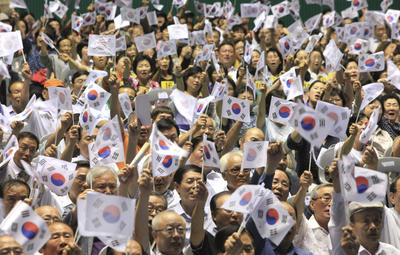And the prospects for new negotiations to achieve agreement are further complicated by China, whose interests are increasingly seen as divergent from the non-proliferation objectives of the US.
North Korea abandoned the Six-Party process in April 2009, conducted a second nuclear test explosion and, in 2010, brought the peninsula closer to war than it has been for decades by torpedoing a major surface warship in March and shelling a South Korean island in November. And, for the first time in living memory, South Korea’s government found it very difficult to resist retaliation. It did so with a program of military exercises and by taking a declaratory position on future provocations in order to sharpen the deterrent message to Pyongyang.
Some of the US attitudes and approaches toward engagement with the DPRK over the years have been rightly criticised. But equally, Pyongyang has milked successive rounds of talks for political and material gains only to find some intolerable insult at the eleventh-hour that ‘required’ walking away. Most have now concluded that it never contemplated relinquishing the nuclear option. An essential part of the problem may well lie in the apparent fact that the DPRK wants an extensive package (acceptance, recognition, a peace agreement, security assurances, economic aid, energy security) but only on the condition that none of this risks disturbing its internal arrangements in any way.
Hopes had lingered that China would put its non-proliferation interests ahead of narrower national interests. This ended when China conspicuously chose to insulate the Kim regime from the reactions to its aggressive actions in 2010, including giving new prominence to its security alliance with the DPRK for the first time in nearly 20 years. The White House let it be known late in 2010 that the US saw China as ‘enabling’ the DPRK’s provocative brinkmanship on the peninsula as well as its nuclear and missile proliferation activities with Iran, Syria and possibly Burma. The DPRK has become a hurdle in the US-China quest to develop a constructive partnership.
Pyongyang signalled at the summit with Russia that it was ready to resume discussions to consider a moratorium on the testing and production of missile and nuclear weaponry. But the US and South Korea have pre-conditions. An IAEA-monitored moratorium on nuclear weapon-related activities is what was agreed to 17 years ago — and Washington will not pay again to secure restraints agreed to in the past. Seoul also wants acknowledgement by the DPRK of responsibility for the provocations of 2010.
Given these challenges, how can the process be given a different chemistry, a fresh dynamic, or a new trajectory?
Resumption of the Six-Party process will be pointless unless additional supportive processes are in place, especially allowing for a more robust dialogue between the two Koreas than recent token endeavours. China and the US also need to confirm the extent to which they share objectives and priorities for the Six-Party process.
Two thoughts deserve further consideration. First, in September 2005, the Six-Party process agreed that an eventual package supporting the verifiable elimination of the DPRK’s nuclear weapon capacities would have political, security, economic and energy components. Then the process lost coherence. One preliminary objective for renewed negotiations might be to reaffirm what the components of an eventual package will be, and then to agree that the process is sufficiently mature for the negotiations to remain permanently in session until all the details are in place.
Second, China has hosted the Six-Party process since it got underway in 2003. This helped China come across as removed from the situation, and suited to the role of facilitation. Others accepted that the DPRK needed a sympathetic host. China’s relative detachment is now too clearly a myth — it has strong interests in how events on the Korean peninsula play out. A healthy negotiating process should allow China to participate as an equal, rather than in the influential position of host.
But if China does not host the talks, where could they go? An appropriate answer might be Panmunjon in the Demilitarised Zone that separates the two Koreas. Seoul and Pyongyang could jointly or alternately host the process at this evocative location. But the facilities are Spartan, and almost certainly inadequate to support six delegations. And this would not necessarily be a quick fix. It puts even more weight on the North-South dialogue, a process that is substantively non-existent at this point. There are other possibilities. For example, the host role could rotate among the six participants, although this would be costly and probably distracting. Alternatively, the United Nations could host the negotiations and recommend a suitable location.
The DPRK’s quest for a functioning nuclear arsenal is in danger of becoming accepted as part of the ‘noise’ of the contemporary international scene: something that bubbles up from time to time only to slip below the radar again. A DPRK with a functioning nuclear arsenal could have profound consequences in and beyond Northeast Asia. If the renewed Six-Party process fails to drive toward an enduring solution, the next phase of this saga may well see parties trying to manage the reality of a nuclear North Korea.
Ron Huisken is Senior Fellow at the Strategic & Defence Studies Centre, ANU College of Asia & the Pacific, The Australian National University.

